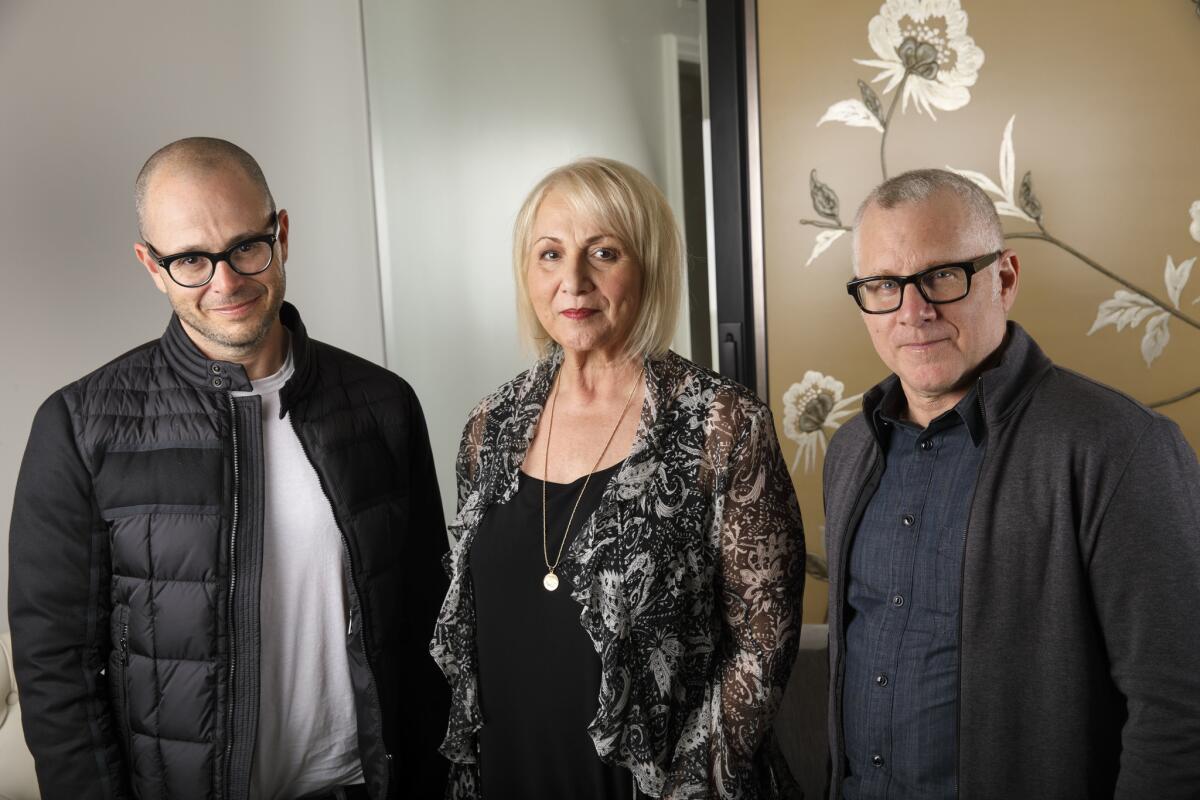As HBO’s ‘The Leftovers’ begins its final season, the producers talk endings and anxieties

- Share via
Considering the bleak tone of the show, it’s encouraging that hope springs eternal among the producers of HBO’s “The Leftovers,” which returns to start its final season Sunday.
But hope takes curious forms in “The Leftovers” universe.
“It almost feels as though the show has gotten distilled and every episode is dripping with this apocalypse,” says executive producer and co-creator Tom Perrotta.
“I feel confident,” said director and executive producer Mimi Leder about the writing on the last stretch of episodes.
Shifting in his seat at a high-end Los Angeles Italian restaurant, listening to his collaborators, co-creator Damon Lindelof jumps in, “This is all making me feel very uncomfortable.”
Uncomfortable?
“Yeah, that everything’s going to be OK.”
Lindelof speaks as a man who has been burned by the system before: The controversial 2010 series finale of Lindelof’s “Lost” inspired so much fan vitriol that the show runner left Twitter for good.
He is understandably wary, then, about endings. But while his vocalized discomfort was referring to whether or not fans would embrace the close of “The Leftovers,” he could just have easily been referencing the question at its core: When everything ends, can you find a way to be OK?
When “The Leftovers” debuted in 2014, the pilot depicted an unexplained global incident called the “Sudden Departure,” wherein 2% of the world’s population disappeared without a trace, and then immediately made a three-year time jump. From the outset, the series was never about what happened to those who disappeared but rather what will happen to those who didn’t.
Based on Perrotta’s novel of the same name, the events of Season 1 centered on the fictional town of Mapleton, N.Y., and the family and acquaintances of Kevin Garvey (depicted in the series to soulful, bewildered perfection by Justin Theroux) as they struggle to make sense of life post-departure. While Perrotta’s involvement in the show made perfect sense throughout the first chapter of HBO’s critically acclaimed drama, it was less clear how he would acclimate when the series evolved beyond its origin story.
“Part of what makes a writer a good writer is that you care deeply about your ideas,” Perrotta says of the growing pains of collaboration. “There’s always that resistance that you have to surrender authority. But it opens you up to all kinds of new pleasures once you surrender.”
“I think a fundamental failure of most adaptations is they try to push the author aside,” Lindelof said. “I couldn’t think of a better recipe for failure.”
It’s Perrotta’s continued involvement, as well as the addition of auteur Leder (“ER,” “Shameless”), that Lindelof credits with the show’s success. “The things that I love most about the show came from brains other than mine and through that collaborative effort, the show is so much better for it,” Lindelof explains.
Yet, when you’re dealing with the emotional weight of topics that Lindelof calls “radioactive” — issues that range from the existence of God to the possibility of life beyond death to the existential instability of the apocalypse — there are many potential recipes for failure.
So, when HBO came calling for a third season, the producers agreed, but only if it were the show’s last.
“You don’t want to wear out your welcome. These characters can exist for how long?” asks Leder.
“‘Leftovers’ in the refrigerator. Three seasons, that’s all you got,” Lindelof quips. “Then they go bad.”
Knowing the end was nigh provided a unique set of challenges. The writers room was now tasked with (metaphorically) snuffing out the world they spent the last two seasons creating, while Leder scouted locations in the Australian outback, engaging in symbiotic creation with the story being broken back in the States.
“It was exciting as writers because they would send pictures from the scouts and we’d say, ‘Ooh, let’s put something [in that location],’” Lindelof recalls.
“‘We don’t know what it is, but this is great.’” Leder adds with a laugh.
Season 3 also afforded Leder another opportunity to open with a disconnected, wordless historical prologue that serves as thematic table-setting.
As Season 2 began with a prehistoric woman struggling for survival in what would eventually become (fictional) Jardin, Texas, Season 3 begins with a similar overture, set in Australia.
“To bring that to life with no words, just pictures, is one of the hardest and most fulfilling things you can do as a filmmaker,” Leder says. “No words, just feelings.”
It all comes back to feelings for “The Leftovers.”
The producers discuss the biblical journey of Job, whose faith was tested repeatedly by God, often in relation to their characters who struggle to live and search for meaning in a world where giving up is increasingly seductive.
“Without the reward, there is no purpose for suffering. That’s ultimately the game we’re playing with our viewers,” Lindelof says. “The question is, ‘You have now suffered for three seasons, 28 episodes. Do you feel rewarded?’”
Lindelof hopes that fans will feel just that.
The weight of knowingly crafting “The Leftovers” final chapter combined with Lindelof’s history with endings led to a single burning question: When it comes to endings, is it worse to not know the answers or to be unhappy with the answers you receive?
To a one, the producers embraced the comfort of the unknown.
Lindelof explains by sharing an anecdote from early in his relationship with Perrotta, wherein he asked the author for details, not about the “Sudden Departure” but if Perrotta himself knew where the departed had gone.
Perrotta’s answer? “I’ve got to be honest with you, I just never even really thought about it.”
Endings don’t matter. Journeys do.
See the most-read stories in Entertainment this hour »
‘The Leftovers’
Where: HBO
When: 9 p.m. Sunday
Rating: TV-MA (may be unsuitable for children under the age of 17)
The complete guide to home viewing
Get Screen Gab for everything about the TV shows and streaming movies everyone’s talking about.
You may occasionally receive promotional content from the Los Angeles Times.




